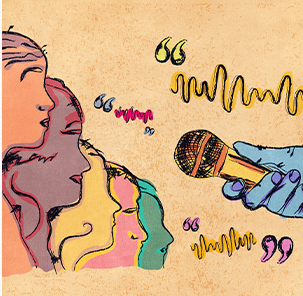Subscribe and receive the best Inkyfada podcasts straight to your mailbox.
Don't miss out! Subscribe to our newsletter to receive the latest Inkyfada podcasts.
Thanks for your inscription
Unsubscribe at any time

As we delve deeper into the intricacies of the colloquial language, the linguistic phenomena we discover become more and more particular, with a rhythm, cadence, and meaning faithfully conveyed by the collective memory.
Folk proverbs, with their astonishing ability to evolve and adapt, use language and its vocabulary to convey a meaning and a context in a certain style, creating a sort of an inner music that inhabits the mind.
Why do we need proverbs? And how are they orally transmitted from generation to generation, from the moment of their initial utterance, to their present day context and usage?
How does language with its constant enriching and evolving serve to establish a precise pattern that contributes to the consolidation of meaning in memory?
And if proverbs are a way to understand a culture, what are the images that are conveyed in Tunisian ones? How do they deal with specific subjects that reveal the social representations of the past, and still influence individuals today?
Inkyfada Podcast is the first platform entirely dedicated to original Tunisian podcasts, and was conceived by Inkyfada media in collaboration with the in-house research and development laboratory, InkyLab. Inkyfada joined the global podcast boom in 2017, when the team produced the first Tunisian audio documentary, diving deep into the belly of the El Kamour struggle taking place in the desert. Since then, Inkyfada Podcast has produced a wide variety of documentaries, investigations, and podcast series, as well as articles accompanied by music; covering a multitude of contemporary issues in order to offer an immersive and alternative podcast experience. Whilst exclusively offering audio content, the Inkyfada Podcast team upholds the same core values and principles of inkyfada.com, and is committed to producing high quality content though a dynamic and meticulous production process. In addition to the permanent team, Inkyfada podcast works closely with various journalists, artists, illustrators, musicians and other content creators in order to diversify the platform and support artistic creativity. These podcasts differ from traditional radiophonic content in that the applied production and editing process is more akin to cinematographic techniques, in addition to being web-based, downloadable and accessible on demand. Additionally, Inkyfada Podcast uniquely offers subtitles in French, Arabic and English for all audio content, the majority of which is recorded in Tunisian or in the preferred language of the speaker in question.